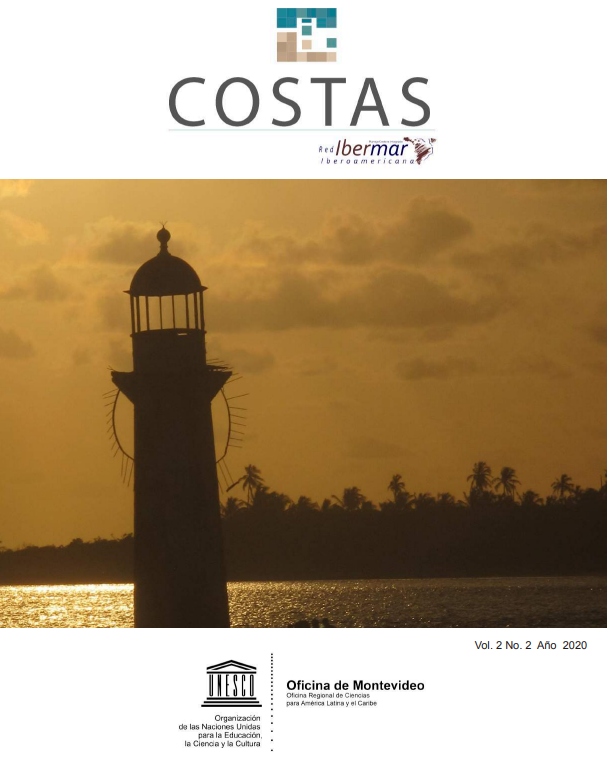Covid 19 y el Antropoceno: aportes desde la gobernanza costera y el MIZC

Información
Resumen
El presente es un artículo de revisión y opinión. Parte de la llegada de la Fase Tres del Antropoceno, en la que tienen lugar cambios sistémicos en las dinámicas económicas, sociales y ambientales bajo la influencia creciente de las actividades humanas. Apostamos que estamos transitando a una época de intensificación en los desequilibrios económicos, eventos climáticos extremos, pandemias y conflictos sociales. Se identifica a la pandemia COVID-19 como una manifestación de esta Fase. Se revisa la experiencia del manejo integrado de zonas costeras (MIZC) en Latinoamérica con enfoque en el marco conceptual y metodológico conocido como Órdenes de Resultados y se discute el potencial de estos enfoques para aprender y mejorar las respuestas de la sociedad a los múltiples problemas largo las costas. Se defiende la tesis de que los aprendizajes de la gobernanza costera en varias iniciativas MIZC son útiles para avanzar hacia una gobernanza de ecosistemas y sus principios pueden aportar ventajas para reducir los riesgos de desastres ambientales y sociales y aportar a la sostenibilidad ambiental y a la equidad social. Se exponen los esfuerzos que se realizan desde la Cátedra internacional de MIZC Stephen Olsen.
Palabras clave
Agencias de apoyo
Cómo citar
Licencia

Esta obra está bajo una licencia internacional Creative Commons Atribución-NoComercial-SinDerivadas 4.0.
Citas
Andrade, A., Arguedas, S. y Vides R. 2011. Guía para la aplicación y monitoreo del Enfoque Ecosistémico, CEM-UICN, CI-Colombia, ELAP-UCI, FCBC, UNESCO-Programa MAB.
Barragán Muñoz, J.M. (coord.). 2011. Manejo Costero Integrado y Política Pública en Iberoamérica: Propuestas para la acción. Red IBERMAR (CYTED), Cádiz, 280 pp.
Barragan, M. 2012. Iniciativa Iberoamericana de manejo costero integrado: ideas para el progreso de una nueva política pública. En Manejo costero integrado en Iberoamérica: Diagnóstico y propuestas para una nueva política pública. Red Ibermar (CYTED), Cadiz, 69-117.
Barragan, J. M. 2014. Política, gestión y litoral: Una nueva visión de la gestión integradora de áreas litorales. UNESCO – Madríd.
Baztan, J., et al, (2012) Los desafíos de las zonas costeras en el siglo XXI: propuestas
www.oannes.org.pe/upload/201204171439101576153038.pdf)
Brooks, K., y Fairfull, S. 2017. Managing the NSW coastal zone: restructuring governance for inclusive development. Ocean & Coastal Management.150:62-72.
Cabrera, A. y Conde, D. 2020. Experiencias y retos del Manejo Costero Integrado a nivel local en Iberoamérica. 255-290.
CBD (Convención de Diversidad Biológica). 2004. - Integrated Marine and Coastal Area Management (IMCAM) approaches for implementing the Convention on Biological Diversity. 51p., CBD Technical Series nº 14.
Diamond, Jared, 2006. Colapso. Por qué unas sociedades perduran y otras desaparecen. Penguin Random House Grupo Editorial, S.A.U. Barcelona. 746 pp.
GESAMP, Grupo Mixto de Expertos: OMI/FAO/UNESCO-COI/OMM/OMS/OIEA/Naciones Unidas/PNUMA, sobre los Aspectos Científicos de la Protección del Medio Marino. 1999. La Contribución de la Ciencia al Manejo Costero Integrado. Organización de las Naciones Unidas para la Agricultura y la Alimentación. Roma, 61.
Milanés Batista, Celene, Sierra-Correa, P.C. y Lastra Mier, R. (compiladores). 2019. Estudios de caso sobre manejo integrado de zonas costeras en Iberoamérica: gestión,riesgo y buenas prácticas”, Universidad de la Costa, Barranquilla, Colombia.
Olsen, S. 2003. Framework and indicators for assessing progress in integrated coastal management iniciatives. Ocean & coastal management. 46:347-361.
Olsen, S., Sutinen, J., Juda, L., Hennessey, T. y Grigalunas, T. 2006. A Handbook on Governance and Socioeconomics of Large Marine Ecosystem. Coastal Resources Centre, University of Rhode Island.
Olsen, S., Page, G., Ochoa, E. 2009. The Analysis of Governance to Ecosystem Change: a Handbock for Assembling a Baseline. GKSS Research Center, Geesthacht, p. 87. LOICZ reports and studies, nº 34.
Olsen, S., Rubinoff, P., Ochoa, E. y Vallejo. S. 2010. A Certification program in the governances of coastal ecosystems. Coastal Management. 38:262-271.
Olsen, S., Olsen E. y Schaefer N. 2011. Governance baselines as a basis for adaptive marine spatial planning. Coast Conserv. 15:313-322.
Stepanova, O. 2015. Conflict resolution in coastal resource management: Comparative analysis of case studies from four European contries. Ocean & Coastal Management. 103:109-122.
Taljaard, S., Slinger, J., Morant, P., Theron, A., Niekerk, L., y van der Merwe, J. 2012. Implementing integrated coastal management in a sector-based governance system. Ocean & Coastal Management. 67: 39-53.
Wilkinson, R. and K. Picket, 2009. The Spirit Level: Why Greater Equality Makes Societies Stronger. Bloomsbury Press. 331pp.


